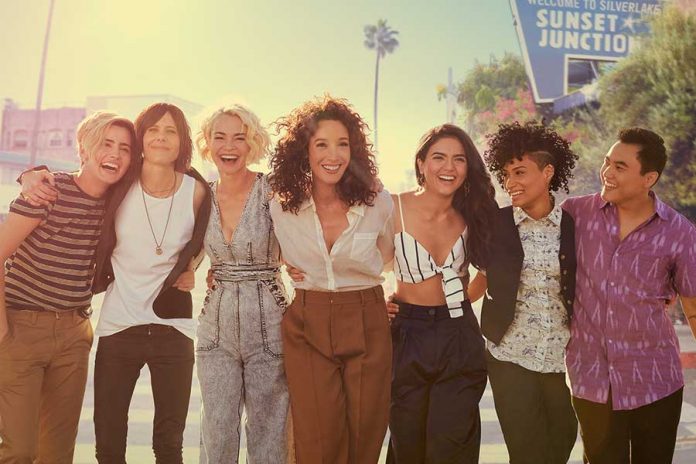It’s been a decade — International Women’s Day 2009, to be exact — since the final episode of “The L Word” aired. Over six seasons, the groundbreaking series was the first ever to center lesbian and bisexual women. The show’s creator, Ilene Chaiken, now an executive producer on Fox’s “Empire” and a producer on “The Handmaid’s Tale,” changed the TV landscape with her drama about a group of West Hollywood lesbians leading ordinary lives like, well, lesbians.
There had never been a series like it, and there hasn’t been one since. While there have been many series with queer characters in the decade post-“The L Word,” there has also been an epidemic of dozens of lesbian characters killed off just as they find love.
After a decade-long hiatus, Showtime, which aired the original series, has debuted “The L Word: Generation Q,” and it is everything any LBTQ viewer could want — a whole lot of realism and lots of drama. “Gen Q” has all of the heart of the original series — three of the original’s most beloved cast members, Bette (Jennifer Beals) and Shane (Katherine Moennig) and Alice (Leisha Hailey), and a new group of lesbian, queer, gender fluid and trans men characters. Where the original series was mostly white, upper-middle-class and wealthy, “Gen Q” is racially, ethnically and more economically diverse.
Marja-Lewis Ryan, a lesbian actress, director, playwright and producer, is showrunner for “Gen Q.” She said, “Ilene [Chaiken] and the original ‘L Word’ made me believe that my voice mattered. I am beyond excited for the opportunity to usher in the next generation of diverse queer people.”
Ryan said, “I was in my late teens when ‘The L Word’ came out — and it changed my life. I wouldn’t have been a writer if I didn’t know who Ilene Chaiken was. Knowing that I could write stories about lesbians made me become a writer.”
She “wants to be sure that there’s something compulsively watchable inside each episode.”
So far, so very good.
“Gen Q” has switched locales from West Hollywood to Silver Lake, a more diverse neighborhood in LA. The story focuses on the three originals and four others, but there is a real community feeling in the new series that draws the viewer in immediately. These are women we know and situations we relate to, within a queer landscape that is packed and ready to move into the new decade.
“Gen Q” begins with Bette running for mayor because of the opioid crisis in her community. Alice is a talk show host, and Shane is still the sexy androgynous hairdresser everyone wants because some things are immutable in the lesbian community. But now Shane is also rich with a huge house, which makes for some interesting dynamics.
The original characters are better than ever — older, deeper and even more compelling. Their presence is big and anchors the original series to the new one.
In the mix now are four new principles: Sarah Finley (Jacqueline Toboni, the leather butch from “Grimm”) is estranged from her Christian family and evokes a layer of butch bravado that can be a little intense. Finley is Alice’s executive assistant — and she is drawn to Shane.
Sophie Suarez (Rosanny Zayas) works with Finley as a production assistant on Alice’s talk show. Sophie’s fiancé, Dani Núñez (Arienne Mandi), is the director of communications for her father’s company, Núñez Inc. Sophie loves her family, and her story provides pushback to the narrative that all families reject their LGBTQ kids. But Dani has conflict with her family and is trying to navigate her relationship with them.
Micah Lee (Leo Sheng), is a trans man and adjunct professor and has a deep connection to Dani. Micah, Sophie, Dani and Finley all share a place together, which is not always a comfortable fit.
“Gen Q” delves deep into the issues of 20- and 30-something queers trying to forge their path in the world. While nearly everyone was economically comfortable or outright wealthy in the original series, the Gen Q characters are less so, though still sheltered and relatively stable. They share space because they must. Finley hangs out with Shane to escape cramped quarters and have some space from her friends. Micah takes someone to dinner on a gift card. Sophie and Dani wonder about the cost of a wedding and argue over who is taking what job.
“Gen Q” is trying to get it all right this time and succeeds much of the time. Like “Pose” and “Euphoria,” the series is breaking fresh ground with characters that are both new to the TV landscape and real to the viewer. It’s exciting to see trans men seamlessly interpolated into this version of the “L Word,” as Max’s portrayal — and reactions from the original characters to Max — in the earlier show was one of the series’ most significant failings. Along with Micah, Pierce (Brian Michael Smith) is Bette’s campaign manager and a trans man. Both characters are also played by trans men, each from a different generation.
This rendition features more people of color, which is imperative to a show set in LA — half of the main characters are women and trans men of color. And the economics of being queer must be addressed — and they are. The show is still finding its narrative flow and footing but has a ready-made audience perfectly primed for “Gen Q” to tell new stories with new and established characters.
“The L Word: Generation Q” is a compelling new TV series for a new generation — as well as the generation that grew up on the original series. Watch Sundays on Showtime and on-demand!

